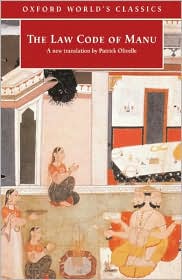
Speaking at the 14th meeting of the Italian Association of Sanskrit Studies, Daniele Cuneo discussed some puzzling verses in Manusmṛti XII. [As before, I will try to reproduce the gist of his paper; my comments will be in square brackets.]
The verses are:
yo 'syātmanaḥ kārayitā taṃ kṣetrajñaṃ pracakṣate |
yaḥ karoti tu karmāṇi sa bhūtātmocyate budhaiḥ || 12 ||
jīvasaṃjño 'ntarātmānyaḥ sahajaḥ sarvadehinām |
yena vedyate sarvaṃ sukhaṃ duḥkhaṃ ca janmasu || 13 ||
tāv ubhau bhūtasaṃpṛktau mahān kṣetrajña eva ca |
uccāvaceṣu bhūteṣu sthitaṃ taṃ vyāpya tiṣṭhataḥ || 14 ||
asaṃkhyā mūrtayas tasya niṣpatanti śarīrataḥ |
uccāvacāni bhūtāni satataṃ ceṣṭayanti yāḥ || 15 ||
According to Cuneo (who follows Patrick Olivelle's first view, now partially altered, and Federico Squarcini's one), the Manusmṛti should be collocated in the II c. b.C. and it constitutes a conscious reply to the ascetic issues raised by Jainists and Buddhists. The XII book is dedicated to the theory of action and retribution. Hence, his conclusion will be, these verses aim at indicating an enduring self who can be the carrier of merit and demerit from life to life (a "responsible agent"). Such a metaphysical thesis can ground justice on a human level.
Accordingly, the verses discuss several alternatives, departing from the Sāṅkhya or proto-Sāṅkhya kṣetrajña, but then introduce the more neutral jīva ("individual Self") in order to identify such responsible agent. The kṣetrajña is defined first as ātmanaḥ kārayitā, where ātman is interpreted by all commentators as 'body'. Cuneo further proposed to interpret it as the prakṛti-part of its cognitive apparatus. [I agree that the Sāṅkhya puruṣa or kṣetrajña could never be the responsible agent the author aims at, since he does not act at all. But the use of kārayitā and of pravartayitṛ found in the commentaries thereon hints at a different kind of theory –or a different kind of Sāṁkhya]. [Why is mahān dismissed?] [v. 12 seems to draw the picture of a kṣetrajña which causes the bhūtātman to do. This, in turns, "does acts". If it is so, then, is the bhūtātman the same as the ātman and, hence, the same as the body? Or does it still imply a sort of awareness? If the latter, why did not the author of Manusmṛti choose bhūtātman as the responsible agent he was looking for? And why is instead the jīva identified as a knower rather than a doer? v.13ab designates the jīva as a possibly transmigrating entity and this suits well Cuneo's thesis.]
According to Cuneo, the pivotal role of jīva is highlighted by the pronouns tam and tasya which cannot but refer to it (since tam in v. 14 is masculine and since kṣetrajña and mahān have been mentioned in the above pada as something different).
His translation of the relevant padas is more or less as follows [my rendering from Cuneo's Italian]: "the two kṣetrajña and mahān constantly pervade him (=the jīva). Out of its configuration (śarīra) innumerable kinds of people (mūrti) arise". That is, out of the qualities (guṇa) of the jīva arises the distinction between agitated, calm, sad people. The role of guṇas and the corresponding kinds of people has been explained elsewhere in the Manusmṛti, where the term mūrti is also found referring to such "kinds" of people.
Cuneo also highlighted how the commentators cannot be used to understand this passage (and, possibly, the whole Manusmṛti), since they lived much later than the author of the Manusmṛti (the first commentator dates to the 500-650 A.D.) and have much different agendas. In the case at stake, they are influenced by vedāntic ideas. For instance, they agree in identifying the paramātman (never mentioned in the verses!) as the referent of tam and tasya. Further, they identify differently the other elements (jīva is said to be manas or buddhi, the mahat is said to be the antaḥkaraṇa). Cuneo also pointed out that a universal self could be detected in the Manusmṛti only in a very different context, that is, in the I book, where a prabhū or svayambhū chas a cosmogonic function.
Finally, Cuneo takes for granted that the Manusmṛti is the work of an author. The issue of authoriality is a key term in the recent development of Sanskrit studies. During the same meeting, it has been applied to Vedic studies (to the hymns ascribed to Dīrghatamas).

No comments:
Post a Comment